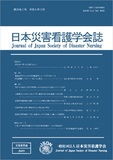Japanese
English
- 有料閲覧
- Abstract 文献概要
- 参考文献 Reference
要約
目的:学童期に新潟県中越震災を体験した子どもたちが,成人期に至るまで,被災体験からどのような影響を受けて内在化してきたのか記述することを研究目的とした.
方法:研究参加者は,学童期に新潟県中越地震の被災体験を有し調査開始時点で20歳以上の人とした.半構造化面接法により被災当時から現在に至るまでの体験を語ってもらった.得られたデータは修正版グラウンデッド・セオリー・アプローチの手順に則り分析した.
結果・考察:研究参加者は8名,平均年齢は26歳,被災当時の年齢は平均9.8歳であった.分析の結果,14の概念,6つのカテゴリーそのうち,コアカテゴリーである【親がいてこその安堵感】が抽出された.被災体験が今につながっていると感じるプロセスは,被災地で過ごす不安定な気持ちの拠り所である親の存在のありがたさを土台として人生の価値観を方向付けるプロセスであった.
Abstract
Pursose: The present study aimed to describe how children who experienced the Niigata-Chuetsu Earthquake during their elementary school years internalized the experience of the disaster and how it affected them until adulthood.
Methods: The participants were eight people-with a mean age of 26 years and an average age at which they were affected of 9.8 years-who had experienced the Niigata-Chuetsu Earthquake when they were elementary school students and were at least 20 years of age at the time of the survey. Semi-structured interviews were conducted to assess the impact of their disaster experiences. Data were analyzed using the modified grounded theory approach.
Results: We extracted 14 concepts and six categories, of which the core category,[Peace of mind in the presence of parents], was the most important.
Conclusions: We found that a belief that the disaster experience was connected to the present was a process of orienting life values based on gratitude for the presence of parents during the anxiety caused by the earthquake.
Copyright © 2023, Japan Society of Disaster Nursing All rights reserved.


